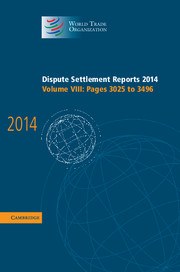Book contents
- Frontmatter
- Contents
- United States - Countervailing and Anti-Dumping Measures on Certain Products from China (WT/DS449): Report of the Appellate Body
- United States - Countervailing and Anti-Dumping Measures on Certain Products from China (WT/DS449): Report of the Panel
- Cumulative List of Published Disputes
United States - Countervailing and Anti-Dumping Measures on Certain Products from China (WT/DS449): Report of the Appellate Body
Published online by Cambridge University Press: 12 December 2017
- Frontmatter
- Contents
- United States - Countervailing and Anti-Dumping Measures on Certain Products from China (WT/DS449): Report of the Appellate Body
- United States - Countervailing and Anti-Dumping Measures on Certain Products from China (WT/DS449): Report of the Panel
- Cumulative List of Published Disputes
Summary
INTRODUCTION
China and the United States each appeals certain issues of law and legal interpretations developed in the Panel Report, United States – Countervailing and Anti-Dumping Measures on Certain Products from China (Panel Report). The Panel was established to consider a complaint by China with respect to measures taken by the United States regarding the application of countervailing duties to imports from non-market economy (NME) countries, and the United States’ failure to investigate and avoid double remedies in certain countervailing and anti-dumping duty investigations.
The measure at issue in this dispute is Section 1 of US Public Law No. 112-99 (PL 112-99), introducing the new Section 701(f) of the United States Tariff Act of 1930 (US Tariff Act). Before the Panel, China also challenged the failure of the United States authorities to investigate and avoid double remedies in 26 countervailing duty investigations and reviews initiated between 20 November 2006 and 13 March 2012.
The new Section 701(f) of the US Tariff Act, which is established by Section 1 of PL 112-99, applies the countervailing duty provisions of the US Tariff Act to NME countries, except in cases where “the administering authority is unable to identify and measure subsidies provided by the government of the [NME] country or a public entity within the territory of the [NME] country because the economy of that country is essentially comprised of a single entity.” Section 701(f) applies to countervailing duty proceedings initiated on or after 20 November 2006, as well as to all resulting actions by the US Customs and Border Protection and all relating civil actions, criminal proceedings, and other proceedings before a US federal court.
China originally identified a broad set of claims and measures in its panel request, but eventually narrowed them down during the course of the Panel proceedings. China claimed before the Panel that Section 1 of PL 112-99 is inconsistent, as such, with Articles X:1, X:2, and X:3(b) of the General Agreement on Tariffs and Trade 1994 (GATT 1994). First, China claimed that Section 1 is inconsistent with the requirement in Article X:1 to publish “promptly”, because it was “made effective” as of 20 November 2006, but was not published until 13 March 2012.
- Type
- Chapter
- Information
- Dispute Settlement Reports 2014 , pp. 3027 - 3174Publisher: Cambridge University PressPrint publication year: 2016
- 4
- Cited by



